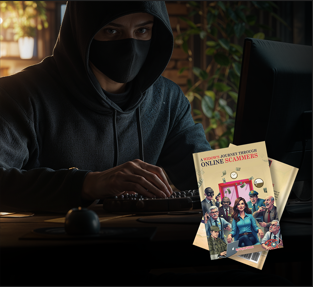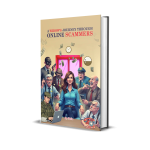
Online dating opens doors to exciting new connections, but it’s not without risks. Scammers seeking to take advantage of unwary consumers are among the legitimate profiles. To keep your money and mental health safe, you need to know how to spot and avoid these risks.
Through her personal experiences with attractive yet deceitful suitors, Nayla Sidani’s book, A Widow’s Journey Through Online Scammers, provides an insightful yet entertaining perspective on the world of online romance scams.
1. Understand the Common Scammer Tactics
Scammers employ psychological tricks to lure victims. Their strategies often include:
- Fast-tracked relationships: Declaring love early on to build trust.
- Fabricated emergencies: Requesting financial help due to sudden “crises.”
- Fake profiles: Using stolen pictures and false information.
Sidani humorously documents moments where scammers fell apart under scrutiny, turning would-be tragedies into comedy gold. Her book demonstrates how a keen eye for inconsistencies can prevent you from falling prey to these scammer tactics.
2. Recognize Online Dating Red Flags in Profiles
Spotting fake profiles is the first line of defense. Look for:
- Overly glamorous photos.
- Grandiose job titles like “admiral” or “CEO.”
- Vague personal details or inconsistent information.
Sidani shares how scammers she encountered frequently boasted of elite professions that conveniently justified their inability to meet in person. It’s probably not real if it sounds too wonderful to be true.
3. Watch for Online Dating Red Flags While Texting
Communication is key in online dating, and scammers often reveal themselves through text. Common signs include:
- Overuse of pet names like “babe” or “darling” early on.
- Frequent typos or awkward phrasing suggest non-native language skills.
- Avoidance of personal questions or evasive answers.
The witty perspective Sidani provides on the absurd texts she received underscores the manner in which scammers exploit language to establish a deceptive sense of intimacy. Staying alert to inconsistencies can help you spot the difference between sincerity and deceit.
4. Be Cautious with Requests for Money
Scammers often fabricate dramatic tales to justify asking for money, such as:
- Emergency medical expenses.
- Stolen wallets or frozen accounts.
- Funds needed to visit or complete a business deal.
Sidani recounts instances where scammers spun outlandish stories, hoping to play on her sympathy. The best defense is simple: never send money to anyone you haven’t met in person.
5. Verify Their Identity
Before trusting someone, take steps to verify their authenticity:
- Use reverse image searches: Check if their photos are stolen from another source.
- Ask for a video call: Genuine individuals will happily oblige, while scammers will find excuses.
- Check their social media: Inconsistencies in their online presence can be a red flag.
Sidani highlights how these simple techniques saved her from falling victim to false personas.
6. Avoid Sharing Personal Information Early On
Be cautious about what you reveal in conversations. Scammers often fish for sensitive details like:
- Bank account information.
- Home addresses or family details.
- Work-related information that could be used for identity theft.
Sidani’s book offers a humorous reminder of how scammers probe for information under the guise of casual conversation. Stay guarded until you’re confident in their authenticity.
7. Trust Your Instincts
If something feels off, trust your gut. Common red flags include:
- Pushy behavior to move the relationship forward quickly.
- Reluctance to meet in person or via video call.
- Stories that don’t quite add up.
Sidani recalls how her intuition often flagged suspicious behavior long before concrete evidence surfaced. Listen to your instincts—they’re a powerful tool in avoiding scams.
8. Stay Informed with Resources Like Sidani’s Book
Knowledge is your best defense. Books like A Widow’s Journey Through Online Scammers offer relatable, real-world examples of scams in action. By understanding common tactics and outcomes, you’ll be better prepared to protect yourself.
9. Keep the Conversation on the Platform
Scammers often push to switch to private communication channels like email or WhatsApp. This move makes their activities harder to trace and report.
Sidani emphasizes the importance of keeping conversations within the app, where reporting tools and protections are in place.
10. Report Suspicious Profiles
Help protect others by reporting scammers. Most dating apps and websites offer tools for flagging suspicious accounts. Reporting not only safeguards you but also strengthens the community.
Why Read A Widow’s Journey Through Online Scammers?
Nayla Sidani transforms her experiences with scammers into an entertaining and educational narrative. From laugh-out-loud moments to practical advice, her book empowers readers to navigate online dating with confidence and caution.
She explains the strategies of romance scammers that many individuals fall prey to through humor and honesty, illustrating that resilience and mirth can convert even the most perilous circumstances into opportunities for personal growth.
How to Get Romance Scam Support
If you’ve encountered online romance scams, there’s help available:
- Support Groups: Connect with others who’ve faced similar experiences.
- Educational Resources: Learn how to spot and avoid scams.
- Counseling Services: Seek emotional support to process the experience.
Remember, being targeted by a scammer doesn’t reflect on your intelligence or character. Scammers are quite good at manipulating people, and asking for assistance shows strength.
Practical Tips for Avoiding Online Dating Scams
- Take it slow: Genuine relationships take time to develop.
- Research their claims: Verify stories and details provided by your match.
- Be cautious with financial topics: Scammers often introduce money problems early on.
- Educate yourself: Read books like A Widow’s Journey Through Online Scammers for insights and laughs.
- Stay skeptical: Healthy skepticism is key to avoiding traps.
Conclusion
Although it’s a great method to meet new people, being cautious is essential when using online dating. By understanding online dating red flags texting, recognizing scammer tactics, and using resources like Nayla Sidani’s book, you can confidently navigate the dating world without falling victim to scams.
Sidani’s story serves as a reminder that dishonesty may coexist with comedy, education, and resilience. Her book is essential reading for anyone new to online dating or experienced users who want to stay safe and enjoy the experience.






Leave a Reply